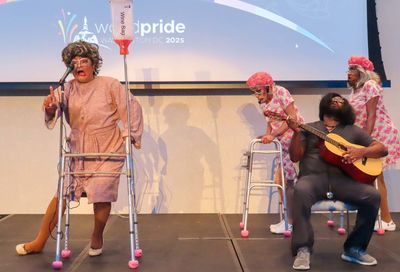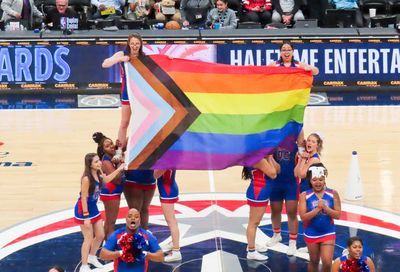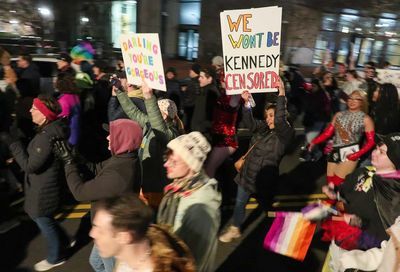Democrats Win Big in Virginia, Danica Roem Makes History
Joshua Cole also among the influx of LGBTQ candidates to win General Assembly seats as Democrats claim the majority in Virginia's legislature.

On Tuesday, Democrats retained control of the Virginia Senate and grabbed back control of the House of Delegates, dealing a blow to Gov. Glenn Youngkin’s presidential ambitions and ensuring that any anti-LGBTQ or anti-abortion legislation will remain bottled up for the remainder of his governorship.
Democrats now enjoy a 21-19 edge in the Senate, and a 51-49 edge in the House. Youngkin and his Republican allies had hoped to wrest control of the Senate away from Democrats to advance conservative policies similar to those pushed by Florida Republican Gov.Ron DeSantis.
Youngkin sought to rally supporters around the cry for “parental rights,” especially as it pertains to parents’ ability to influence their children’s school curricula, library books that are available for checkout, and lessons or materials that touch on LGBTQ identity or race-related issues.
But Democrats countered that Youngkin and Republicans, if given complete control over both chambers, would overstep their authority on cultural issues by banning books, discriminating against LGBTQ Virginians, and restricting access to reproductive health care options.
Tuesday’s results appeared favorable for members of the LGBTQ community.
All nine out LGBTQ General Assembly candidates who qualified for the general election won their races, including, most notably, Del. Danica Roem (D-Manassas), who won the race for the state’s 30th Senate District in western Prince William County.
With her victory, Roem became the first out transgender state senator in Virginia history, and only the second out transgender state senator in the nation, following Delaware’s Sarah McBride, who is now running for Congress.
Roem won by 3 percentage points — the tightest margin of any winning Democratic Senate candidate — fighting back a barrage of last-minute money from Youngkin-aligned political action committees that flooded the district.
She also faced attacks from her Republican opponent, Bill Woolf, who seized upon the issue of transgender student participation on female-designated sports teams — running transphobic ads that were temporarily pulled from airing on cable — in an attempt to cast Roem as out-of-step with Virginia voters.
While some conservative activists claimed Woolf’s attack ads had gained traction in the district, Roem stuck by her assertion that voters were more receptive to her campaign’s focus on food insecurity, transportation and infrastructure, and protecting the environment.
“The voters have shown they want a leader who will prioritize fixing roads, feeding kids, and protecting our land instead of stigmatizing trans kids or taking away your civil rights,” Roem said in a statement following her win.
Other LGBTQ victories included Joshua Cole, a pastor and former one-term delegate who was ousted from his conservative-leaning seat in 2021’s red wave, only to revive his political career in a redrawn, more compact Fredericksburg-area district where the two parties are more evenly matched.
Cole’s victory was the 50th seat to be called for the Democrats, which automatically would have forced Republicans to cede complete control over the House of Delegates via a power-sharing agreement.
But with the victory of LGBTQ ally Michael Feegans in Virginia Beach shortly afterward, Democrats gained their 51st seat and gained complete control over the commonwealth’s lower legislative chamber.
“When I decided to run for office, they told me I couldn’t win,” Cole said in a statement celebrating his victory. “They said I was too young. They told me a Black man couldn’t win this majority white district. They said an LGBTQ+ person couldn’t win this rural seat. Today…we proved that when you bring people together for the good of the community, we can win.”
Four incumbent LGBTQ members of the legislature — Del. Kelly Convirs-Fowler (D-Virginia Beach), Del. Cia Price (D-Newport News), Del. Mark Sickles (D-Franconia), and Sen. Adam Ebbin (D-Alexandria) — were re-elected to their seats on Tuesday evening.
Newcomers include Laura Jane Cohen (D-Burke), Rozia Henson (D-Woodbridge), and Adele McClure (D-Arlington), growing the General Assembly’s LGBTQ caucus to its largest size ever.
Tuesday’s elections also brought some signs of hope for LGBTQ students in the Northern Virginia area, as Democratic-endorsed candidates retained control of the Fairfax County, Prince William County, and Loudoun County School Boards.
All three school boards have resisted the push by Youngkin’s Department of Education to adopt so-called “model policies” that would out students to their parents and ignore transgender students’ identities by allowing administrators and teachers to refuse to call them by gender-affirming names or pronouns.
In the end, Democratic-endorsed candidates retained control of all three boards, and the victories will ensure that conservatives will not be able to threaten to withhold funding from school districts as punishment for pursuing policies with which they disagree.
In Fairfax County, School Board Vice Chair Karl Frisch (Providence), an out gay man, was re-elected and is slated to become the county’s next School Board Chair in January. He will be joined on the board by two other LGBTQ people: member-elect Robyn Lady (Dranesville), an out lesbian, and member-elect Kyle McDaniel (At-Large), who is bisexual.
Lady is Fairfax County’s first elected lesbian official, while McDaniel is the first LGBTQ person in history elected to a countywide seat.
The LGBTQ+ Victory Fund, which endorsed many of the candidates, celebrated Tuesday’s victories as a rebuke of the anti-LGBTQ policies that have sprouted up in other states.
“Today, voters across Virginia resoundingly rejected the politics of bigotry and fear directed at the LGBTQ+ community,” Victory Fund President and CEO Annise Parker said in a statement. “In Virginia and around the country, tonight’s results show that hate is a losing issue at the ballot box.”
Support Metro Weekly’s Journalism
These are challenging times for news organizations. And yet it’s crucial we stay active and provide vital resources and information to both our local readers and the world. So won’t you please take a moment and consider supporting Metro Weekly with a membership? For as little as $5 a month, you can help ensure Metro Weekly magazine and MetroWeekly.com remain free, viable resources as we provide the best, most diverse, culturally-resonant LGBTQ coverage in both the D.C. region and around the world. Memberships come with exclusive perks and discounts, your own personal digital delivery of each week’s magazine (and an archive), access to our Member's Lounge when it launches this fall, and exclusive members-only items like Metro Weekly Membership Mugs and Tote Bags! Check out all our membership levels here and please join us today!
























You must be logged in to post a comment.